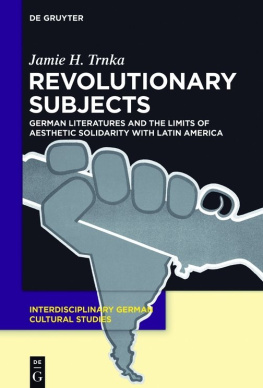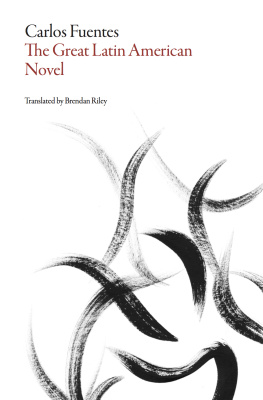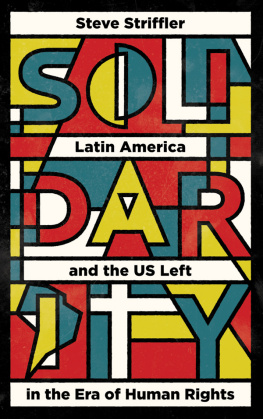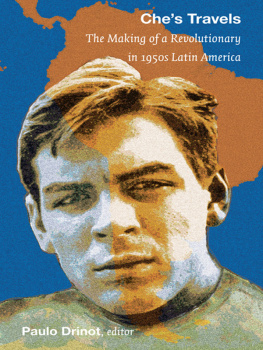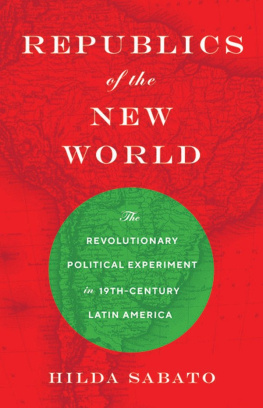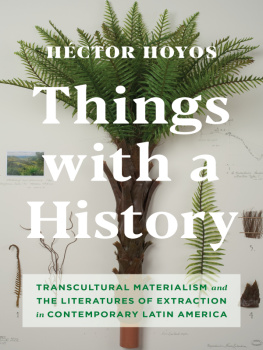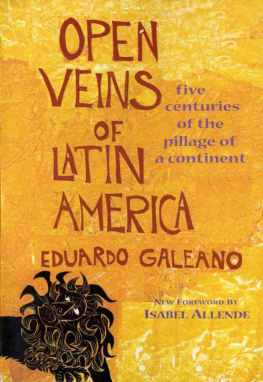Trnka - Revolutionary Subjects: German Literatures and the Limits of Aesthetic Solidarity with Latin America
Here you can read online Trnka - Revolutionary Subjects: German Literatures and the Limits of Aesthetic Solidarity with Latin America full text of the book (entire story) in english for free. Download pdf and epub, get meaning, cover and reviews about this ebook. year: 2015, publisher: De Gruyter, genre: Politics. Description of the work, (preface) as well as reviews are available. Best literature library LitArk.com created for fans of good reading and offers a wide selection of genres:
Romance novel
Science fiction
Adventure
Detective
Science
History
Home and family
Prose
Art
Politics
Computer
Non-fiction
Religion
Business
Children
Humor
Choose a favorite category and find really read worthwhile books. Enjoy immersion in the world of imagination, feel the emotions of the characters or learn something new for yourself, make an fascinating discovery.
Revolutionary Subjects: German Literatures and the Limits of Aesthetic Solidarity with Latin America: summary, description and annotation
We offer to read an annotation, description, summary or preface (depends on what the author of the book "Revolutionary Subjects: German Literatures and the Limits of Aesthetic Solidarity with Latin America" wrote himself). If you haven't found the necessary information about the book — write in the comments, we will try to find it.
Trnka: author's other books
Who wrote Revolutionary Subjects: German Literatures and the Limits of Aesthetic Solidarity with Latin America? Find out the surname, the name of the author of the book and a list of all author's works by series.
Revolutionary Subjects: German Literatures and the Limits of Aesthetic Solidarity with Latin America — read online for free the complete book (whole text) full work
Below is the text of the book, divided by pages. System saving the place of the last page read, allows you to conveniently read the book "Revolutionary Subjects: German Literatures and the Limits of Aesthetic Solidarity with Latin America" online for free, without having to search again every time where you left off. Put a bookmark, and you can go to the page where you finished reading at any time.
Font size:
Interval:
Bookmark:
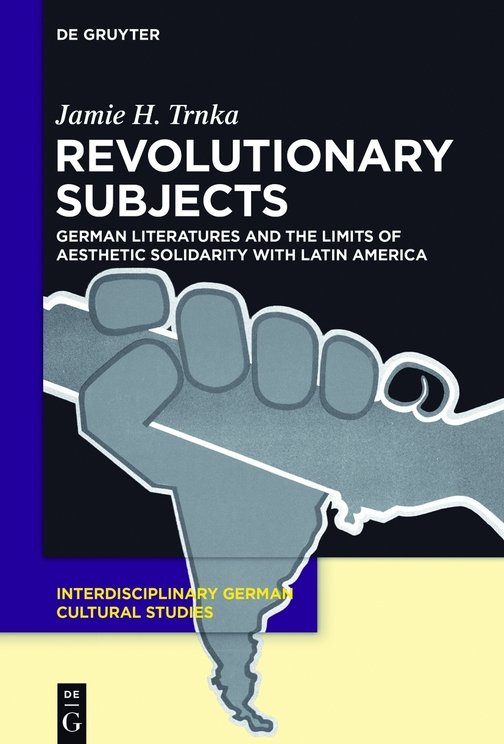
In his exploration of dialectical criticism, Marxism and Form, Fredric Jameson decried the inability to imagine anything other than what is in philosophy and political science, drawing the determined conclusion: It therefore falls to literary criticism to continue to compare the inside and the outside, existence and history, to continue to pass judgment on the abstract quality of life in the present, and to keep alive the idea of a concrete future. To those who remind mesome daily, some at intervalsof the social urgency of literature, I am deeply indebted.
First among them is always Andrew Oppenheimer, who has accompanied me and this book through every stage of its writing. A thoughtful interlocutor, keen editor, and supportive and patient friend, I am grateful to share my life and work with Andrew.
Bettina Brandt provided much encouragement, and kindly read Chapter Two. Her intellectual curiosity and energy are a great source of inspiration to me. A. Hunter Bivens commented on Chapter Three, and was always generous in sharing his considerable insight into East German cultural policy. Patrizia McBride shared her thoughts about Brauns Expressionist referents well before the book was a book; an anonymous reviewer for the German Studies Review also provided feedback on what became Chapter Three. Barton Byg commented on Chapter Four, and afforded me the opportunity to present and discuss parts of it at The University of Massachusetts at Amherst. Daniel Purdy provided the chance to discuss an early version of Chapter Five at Pennsylvania State University. Barbara Potthast invited me to discuss the project at the Department of Iberian and Latin American History at the University of Cologne.
My work at the German Literature Archives in Marbach was generously supported by a C.H. Beck postdoctoral fellowship. Anna Kinder and Marcel Lepper were particularly helpful during my time there, and afforded me the chance to present parts of Chapter Two to other researchers and staff. Hans Magnus Enzensberger and F.C. Delius graciously granted me permission to work with their materials housed at the archives. The University of Scranton provided sabbatical support that allowed me time to write.
Series editors Scott Denham, Jonathan Petropoulos, and Irene Kacandes provided feedback on the manuscript that was remarkable in both its focus and timeliness. Beyond her role as an editor, Irene has supported the projectand metremendously, making time to meet and talk wherever we happened to cross paths, be it in Berlin, Amsterdam, or between panels at the GSA. Editorial director Manuela Gerlof and project editor Stella Diedrich have been a pleasure to work with.
Leslie Adelson, David Bathrick, Natalie Melas, and Debra Castillo offered guidance early on in this project. Sky Arndt-Briggs, Christine Becker, Crina Gschwandtner, Marike Janzen, Susan Mndez, Anna Parkinson, Victoria Rizo Lenshyn, Nikka Pierce, and Yamile Silva have all shared well-timed and much appreciated encouragement. Ileana Szymanski provided a second pair of eyes in preparing my translations from the Spanish of Leopoldo Zea.
Finally, thanks to my family for their love and support.
Sucede que me canso de ser hombre.
Sucede que entro en las sastreras y en los cines
marchito, impenetrable, como un cisne de fieltro
navegando en un agua de origen y ceniza.
El olor de las peluqueras me hace llorar a gritos.
Slo quiero un descanso de piedras o de lana,
slo quiero no ver establecimientos ni jardines,
ni mercaderas, ni anteojos, ni acensores.
Sucede que me canso de mis pies y mis uas
y mi pelo y mi sombra.
Sucede que me canso de ser hombre.
Sin embargo sera delicioso
asustar a un notario con un lirio cortado
o dar muerte a una monja con un golpe de oreja.
Sera bello
ir por las calles con un cuchillo verde
y dando gritos hasta morir de fro.
No quiero seguir siendo raz en las tinieblas,
vacilante, extendido, tiritando de sueo,
hacia abajo, en las tripas mojadas de la tierra,
absorbiendo y pensando, comiendo cada da.
No quiero para m tantas desgracias.
No quiero continuar de raz y de tumba,
de subterrnio solo, de bodega con muertos
ateridos, murindome de pena.
Por eso el da lunes arde como el petrleo
cuando me ve llegar con mi cara de crcel,
y alla en su transcurso como una rueda herida,
y da pasos de sangre caliente hacia la noche.
Y me empuja a ciertos rincones, a ciertas casas hmedas,
a hospitales donde los huesos salen por la ventana,
a ciertas zapateras con olor a vinagre,
a calles espantosas como grietas.
Hay pjaros de color de azufre y horribles intestinos
colgando de las puertas de las casas que odio,
hay dentaduras olvidadas en una cafetera,
hay espejos
que debieran haber llorado de vergenza y espanto,
hay paraguas en todas partes, y venenos, y ombligos.
Yo paseo con calma, con ojos, con zapatos,
con furia, con olvido,
paso, cruzo oficinas y tiendas de ortopedia,
y patios donde hay ropas colgadas de un alambre:
calzoncillos, toallas y camisas que lloran
lentas lgrimas sucias.
I happen to be tired of being a man.
I happen to enter tailorshops and moviehouses
withered, impenetrable, like a felt swan
navigating in a water of sources and ashes.
The smell of barbershops makes me wail.
I want only a respite of stones or wool,
I want only not to see establishments or gardens,
or merchandise, or eyeglasses, or elevators.
I happen to be tired of my feet and my nails
and my hair and my shadow.
I happen to be tired of being a man.
Nevertheless it would be delightful
to startle a notary with a cut lily
or kill a nun with a blow to the ear.
It would be lovely
to go through the streets with a sexy knife
and shouting until I froze to death.
I dont want to go on being a root in the dark,
vacillating, stretched out, shivering with sleep,
downward, in the soaked guts of the earth,
absorbing and thinking, eating each day.
I do not want for myself so many misfortunes.
I do not want to continue as root and tomb,
just underground, a vault with corpses
stiff with cold, dying of distress.
That is why Monday day burns like petroleum
when it sees me coming with my jailbird face,
as it passes it howls like a wounded wheel,
and it takes hot-blooded steps toward the night.
And it pushes me into certain corners, into certain moist houses,
into hospitals where the bones stick out the windows,
into certain shoestores that smell of vinegar,
into streets as frightening as chasms.
There are brimstone-colored birds and horrible intestines
hanging from the doors of the houses that I hate,
there are dentures left forgotten in a coffeepot,
there are mirrors
that ought to have wept from shame and fright,
there are umbrellas everywhere, and poisons, and navels.
I walk around with calm, with eyes, with shoes,
with fury, with forgetfulness,
I pass, I cross by offices and orthopedic shoestores,
and courtyards where clothes are hanging from a wire:
underdrawers, towels and shirts that weep
slow, dirty tears.
Deutsches Literaturarchiv Marbach (DLA)
Handschriftenabteilung: A: Delius
Mediendokumentation: Delius, Friedrich Christian
Mediendokumentation: Enzensberger, Hans Magnus
Font size:
Interval:
Bookmark:
Similar books «Revolutionary Subjects: German Literatures and the Limits of Aesthetic Solidarity with Latin America»
Look at similar books to Revolutionary Subjects: German Literatures and the Limits of Aesthetic Solidarity with Latin America. We have selected literature similar in name and meaning in the hope of providing readers with more options to find new, interesting, not yet read works.
Discussion, reviews of the book Revolutionary Subjects: German Literatures and the Limits of Aesthetic Solidarity with Latin America and just readers' own opinions. Leave your comments, write what you think about the work, its meaning or the main characters. Specify what exactly you liked and what you didn't like, and why you think so.

